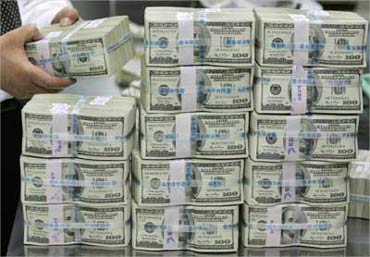Photographs: Reuters T N Ninan
It is easy to agree with the experts who have been sceptical about the Budget numbers.
But even after conceding room for error on the subsidy numbers and therefore on the deficit, it has to be said that this is the most reassuring Budget that the Manmohan Singh government has presented to Parliament.
The two UPA governments have so far displayed an eagerness to increase spending, especially on social sector programmes, and more recently on infrastructure investment.
This is entirely understandable, given the glaring deficiencies in both areas; but from the perspective of fiscal rectitude, there is the affordability question to be considered.
. . .
How India could be transformed into a tax haven
Photographs: Reuters
This Budget is therefore different, not just because of the tight control on spending that is proposed, but also because of the remarkable reduction in the ratio of public debt to GDP.
If things go to plan, the reduction of the ratio proposed by the Finance Commission for 2014-15 will be achieved next year -- three years ahead of target. Accustomed as everyone is to fiscal slippages, this is to be welcomed.
But the task of fiscal correction has barely begun. Two big ticket transitions beckon.
. . .
How India could be transformed into a tax haven
Photographs: Reuters
First, the revenue foregone last year on account of tax concessions and incentives was Rs 79,554 crore (Rs 795.54 billion) on corporate income tax -- mainly accelerated depreciation, software technology parks, etc. -- and on personal income tax a further Rs 36,186 crore (Rs 361.86 billion) -- mostly long-term savings.
Excise concessions cost Rs 170,765 crore (Rs 1,707.65 billion), while customs concessions had the biggest bill: Rs 2,02,240 crore (Rs 2,022.40 billion).
The total bill -- Rs 4.89 lakh crore (Rs 4.89 trillion) -- was nearly 80 per cent of the tax collection in 2009-10!
. . .
How India could be transformed into a tax haven
Photographs: Reuters
Surely, it should be possible to eliminate most of the exemptions and simultaneously lower the rates of tax, so as to be revenue neutral. This is what the proposed GST and the DTC should do, if they are to exploit their full potential.
The peak income tax, for both companies and individuals, could then be no more than 22 per cent. That would make India a tax haven and there would be much less incentive to take money out of the country; if the incentives work, tax revenue would actually climb as people report incomes more honestly.
The key question is whether the finance minister can aim for this by saying 'No' to all or most of the special interests, many of them very vocal.
. . .
How India could be transformed into a tax haven
Photographs: Uttam Ghosh/Rediff.com
The second transition waiting to be achieved is on the subsidy front. The central subsidy bill, mostly on food, oil-related products and fertiliser, is slated to be Rs 1,43,570 crore (Rs 1,435.70 billion) next year.
The Economic Survey cites research, which suggests that between 40 per cent and 55 per cent of foodgrain meant for the poor is pilfered.
The leakages on subsidised kerosene and cooking gas are likely to be even greater. The big reform step, which this Budget seeks to take forward -- cash transfers -- was also mentioned by the finance minister in his Budget speech last year.
. . .
How India could be transformed into a tax haven
If action does result in about a year from now, and proves to be successful, it could be expanded later to replace the food subsidy as well as rural employment guarantee programme.
Taking the budgets for all these, every one of about 50 million families that are below the poverty line could be given Rs 3,000 every month as a cash transfer -- better than what NREG offers, and enough to bring all of them above the poverty line, at no extra cost to the government.
In short, India could be transformed into a tax haven, and a land without absolute poverty. Both dreams can become reality. What is needed is for the finance minister to focus on these big tasks.









article